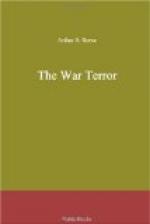“How is she to-day?”
“Not much changed—perhaps not so well.”
“It’s all right, though. That is natural. It is working well. I think you might increase the dose, one tablet.”
“You’re sure it is all right?” (with anxiety).
“Oh, positively—it has been done in Europe.”
“I hope so. It must be a boy—and an Atherton?”
“Never fear.”
That was all. Who was it? The voices were unfamiliar to me, especially when repeated mechanically. Besides they may have been disguised. At any rate we had learned something. Some one was trying to control the sex of the expected Atherton heir. But that was about all. Who it was, we knew no better, apparently, than before.
Kennedy did not seem to care much, however. Quickly he got Quincy Atherton on the wire and arranged for Atherton to have Dr. Crafts meet us at the house at eight o’clock that night, with Maude Schofield. Then he asked that Burroughs Atherton be there, and of course, Edith and Eugenia.
We arrived almost as the clock was striking, Kennedy carrying the phonograph record and another blank record, and a boy tugging along the machine itself. Dr. Crafts was the next to appear, expressing surprise at meeting us, and I thought a bit annoyed, for he mentioned that it had been with reluctance that he had had to give up some work he had planned for the evening. Maude Schofield, who came with him, looked bored. Knowing that she disapproved of the match with Eugenia, I was not surprised. Burroughs arrived, not as late as I had expected, but almost insultingly supercilious at finding so many strangers at what Atherton had told him was to be a family conference, in order to get him to come. Last of all Edith Atherton descended the staircase, the personification of dignity, bowing to each with a studied graciousness, as if distributing largess, but greeting Burroughs with an air that plainly showed how much thicker was blood than water. Eugenia remained upstairs, lethargic, almost cataleptic, as Atherton told us when we arrived.
“I trust you are not going to keep us long, Quincy,” yawned Burroughs, looking ostentatiously at his watch.
“Only long enough for Professor Kennedy to say a few words about Eugenia,” replied Atherton nervously, bowing to Kennedy.
Kennedy cleared his throat slowly.
“I don’t know that I have much to say,” began Kennedy, still seated. “I suppose Mr. Atherton has told you I have been much interested in the peculiar state of health of Mrs. Atherton?”
No one spoke, and he went on easily: “There is something I might say, however, about the—er—what I call the chemistry of insanity. Among the present wonders of science, as you doubtless know, none stirs the imagination so powerfully as the doctrine that at least some forms of insanity are the result of chemical changes in the blood. For instance, ill temper, intoxication, many things are due to chemical changes in the blood acting on the brain.




